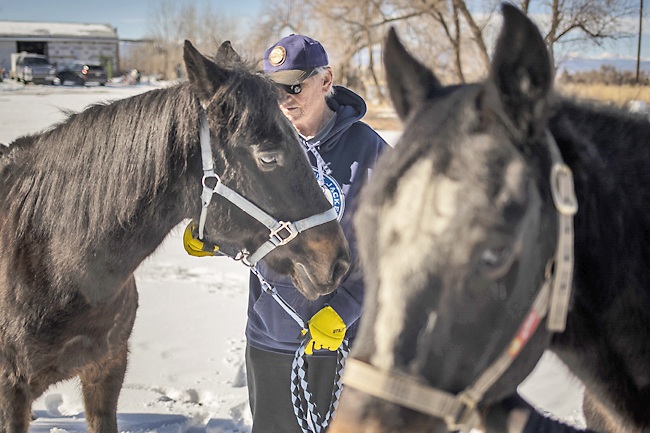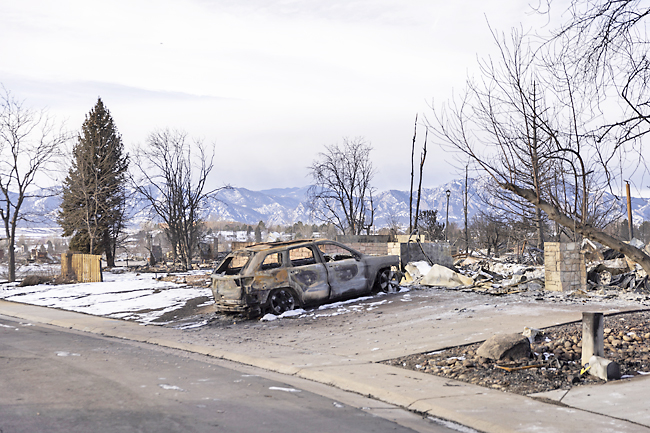Jennifer Oldham
THE WASHINGTON POST – Thirty-foot flames on the back of hurricane-force winds bore down near Yvonne Williams, heating the side of her face as she raced to let her rare Peruvian Paso horses out of their paddock to save them. But there wasn’t enough time.
Her husband, Warren, grabbed her arm and pulled her toward their car as thick, black smoke engulfed the stucco home they built a quarter-century ago in Boulder, Colorado.
“We have to go. We have to run for our lives,” he told her as the Marshall Fire, the most destructive fire in Colorado history, swept through their suburban neighbourhood without warning.
Yvonne for years relied on her horses’ unusual sideways gait to massage her back as she rode, alleviating pain from crippling scoliosis. But they were more than physical therapy – for six years she cared for them as part of her family.
Now, as she was running for her life, Yvonne’s mind was on her horses.
“We get in the car and we can hardly see and bushes are bursting into flames, and a sickening feeling entered my stomach to know my animals are going to be screaming and they are going to burn alive,” she said, recalling how they fled their home about 1pm that day.
Yvonne, 72, and Warren, 74, stopped at several barricades along the circuitous path out of their hilltop oasis, pleading with first responders to allow them to turn around to rescue their animals.


“I said to a fireman, ‘I have to go back to save my horses’,” Yvonne recalled. “And he looked at me with a terrified look on his face and said, ‘Lady, we are here to save lives,
not animals.'”
The couple, who sell real estate as a team, stood on the side of a nearby road and watched the blaze char the picturesque region in the shadow of the Rocky Mountains.
A neighbour told them he saw their barn aflame as he escaped. A friend, rancher Nickie Lafferty, called to ask whether they needed her to pick up the animals. Yvonne told her they were gone.
“She was so upset,” said Lafferty, 49. “It almost made me throw up.”
After midnight, as the Williamses slept restlessly at a Boulder hotel, Warren’s cellphone rang.
The woman on the other end said she had their horses. Cando, 12, and Cango, 19, were in her trailer, she said. They were alive, but their eyes were disfigured, their noses were streaming blood and their black hair was kinky and singed.
Warren, in disbelief, asked her to explain again how their horses were alive.
The woman who called, Stefanee Whitney, a 20-year-old oral-surgery assistant, wanted to know how she could bring the Williamses their horses.
“I asked him where he wanted us to go,” said Whitney, who found Warren’s name on a letter in his soot-covered mailbox. She Googled him and found his business number, which forwarded to his cell.
Whitney and her boyfriend, Josiah Fredericks, 21, recounted the three-hour odyssey that led to them and several friends rescuing the Peruvian Pasos from the smoke-filled neighbourhood.
The group had gathered in the town of Castle Rock, near Denver, earlier that evening to remember a friend who had recently died.
Then Whitney noticed a call for help on a 911 farm animal evacuation page on Facebook.
Without discussion, Whitney and Fredericks jumped up, and three others joined them.
They hurried to pick up a trailer from a friend’s house, Fredericks hitched it to his pickup, and they drove 60 miles to a staging area for animal rescuers, in a parking lot on the cusp of the flames.
Minutes after they arrived, about 9.30pm, heavy smoke streamed from big-box stores just up the highway and a sheriff’s deputy told everyone to go home.
“A couple trucks ended up leaving, and my buddies and Stefanee and I sat there waiting,”
Fredericks recalled.
“Then a fire marshal came and told us two horses needed help – he gave us directions and said: ‘There is active fire going on up there. It is your decision if you want to go.’
“All of us, without a doubt, said, ‘Let’s go.'”
Finding the Williamses’s Mexican-style home on their one-acre lot on Panorama Court wasn’t easy.
Flames were on either side of them as the rescuers drove the deserted streets searching for the turnoff, they said. Fredericks, whose father was an Aspen firefighter for more than 20 years, said he was undeterred by the danger.
As they drew closer, a police officer told them to turn around – until he heard what they planned to do. Then firefighters offered to escort them.
“The neighbourhood was filled with smoke, and there were fires everywhere,” Whitney said. “I looked down the hill and saw straight into someone’s basement. Houses were burned to the ground.”
When the group pulled up to the Williamses’ house, there was no evidence of a barn or a corral or any horses. The metal structure and a tack shed were blackened, twisted metal heaps. Their neighbours’ homes were among 1,100 reduced to ash and hundreds of others damaged.
“The only thing we could see was what the firetrucks were lighting up in front of their house,” Whitney recalled. “I looked to my right and I saw a car that was completely burned – that was where the barn was.”
Fredericks and Whitney got out of the truck and walked around the side of the stucco house, which was still standing. They found the horses huddled together, near a
smoldering fence.
Whitney draped a rope around the neck of one of the horses, and it followed her into the trailer without hesitation. The other was uneasy and took some coaxing with hay to leave.
But that was not a problem for Whitney, reserve grand champion at the 2020 Douglas County Fair riding her Welsh pony.
After tracking down the Williamses, the group drove the horses to the hotel where the Williamses were staying and watched the emotional reunion.
“It was pretty much a miracle,” Yvonne said. “These helpers, they walked through fire to rescue our horses.”
Without a barn to keep them in, Yvonne reached out to her friend Lafferty, whom she had sobbed to hours earlier, to ask whether she could board the pair. Lafferty told them to come right over. So around 2am, Whitney and Fredericks and the horses followed the Williamses for a 25-minute drive to Lafferty’s ranch outside Erie.
After they arrived, Yvonne told the five Castle Rock rescuers how critical the expensive, hard-to-find animals were to her and her husband.
“These horses are extremely important for my wellbeing, so I can walk, let alone not have pain,” Yvonne said. “I told them I wanted to pay them for their kindness.”
She tried to hand a check to Whitney, who refused to take it. “I was thinking she should spend the money on medical care for the horses,” Whitney said. “I was worried if they would get their vision back.”
A month later, the horses’ vision is now restored. Evidence of embers that burrowed beneath two layers of their coats is still evident in bare spots scattered on their backs.
Lafferty washed them three times to rid their coats of the errant fire-starters.
Cango and Cando are largely back to their energetic, curious selves – albeit without much of the luxurious black hair that once adorned their forelocks, manes and tails.
“A lot of it burned off,” Yvonne said on a recent crystal-clear, unseasonably warm day at the Laffertys’ ranch, 12 miles northeast of the Williamses’ damaged neighbourhood. “It’s all singed, and Cango has a few scars around his eyes that he will probably have for life – but he’s alive.”
The horses are adjusting to a temporary life among placid Black Angus cows, quarter horses and a pony that’s prone to escaping his enclosure. It’s a marked change from the first few weeks after they were rescued, when they were still terrified, didn’t want to be touched and wouldn’t allow anyone to put a halter on them.
The Williamses are staying a half-mile away in quarters provided by a local church while they navigate endless hurdles to rebuild their home – which was partially destroyed – as well as their barn and fences.
The couple visit their Peruvian Pasos at least once a day. The valuable breed is difficult to find, in part because of its trademark sideways gait, which results in virtually no bounce for a rider.
Yvonne says that although she’s is in some pain and is limping without her riding therapy, she’s determined not to ride the horses until they’ve fully recovered.
The Williamses are also without reins, ropes and other equipment that burned in the blaze.
A saddlemaker will come measure the horses and make saddles designed to fit.
Yvonne held Cango’s halter lightly as she urged him to walk around her in a circle. The horse’s feet crunched in the snow as he sped to a trot, the majesty of Rocky Mountain National Park in the distance.
Cango, so named because he’s always on the move, quickly got distracted and walked back toward his owner for praise. Nearby, Cando, who received his moniker because he usually does whatever he’s told, leaned his bushy black head into Warren’s midsection.
“Look at his horse,” Yvonne said, gesturing toward her husband of 52 years.
“He’s about crawling into my husband’s lap. That’s his way of saying ‘I love you.’ “
This is exactly what Whitney and Fredericks were hoping would happen when they raced toward the smoke and flames on a single-minded mission those weeks ago.
“It’s hard to believe,” Whitney said about the extraordinary rescue. “I’m such an ordinary person.”





